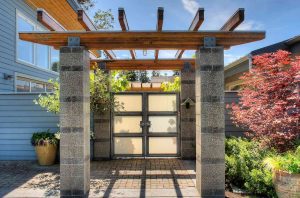Choosing the right material for your residential gate is crucial for ensuring durability, functionality, and aesthetic appeal. Each material offers unique advantages and characteristics, making it essential to understand the differences before making a decision. Here’s a comprehensive guide to the different types of gate materials and their benefits:
1. Wrought Iron
Pros:- Durability: Wrought iron gates are extremely strong and can withstand harsh weather conditions.
- Security: Their robustness makes them a great option for security purposes.
- Aesthetics: Wrought iron can be crafted into intricate designs, adding elegance and a classic look to your property.
- Maintenance: They require regular maintenance to prevent rust and corrosion.
- Cost: Wrought iron is typically more expensive than other materials due to its durability and customization options.
2. Steel
Pros:- Strength: Steel gates are very strong and provide excellent security.
- Versatility: They can be designed in various styles, from modern to traditional.
- Low Maintenance: Galvanized or powder-coated steel gates are resistant to rust and require minimal upkeep.
- Weight: Steel gates can be quite heavy, requiring strong support structures and possibly motorized opening systems.
- Cost: While generally less expensive than wrought iron, high-quality steel gates can still be costly.
3. Aluminum
Pros:- Lightweight: Aluminum gates are much lighter than iron or steel, making them easier to operate.
- Rust-Resistant: Aluminum naturally resists rust, making it ideal for coastal areas with high humidity and salt exposure.
- Low Maintenance: These gates require minimal maintenance compared to other metal gates.
- Strength: Aluminum is not as strong as steel or wrought iron, making it less suitable for high-security needs.
- Cost: High-quality aluminum gates can be expensive, though they tend to be cheaper than wrought iron.
4. Wood
Pros:- Aesthetic Appeal: Wood gates offer a natural and warm look that blends well with various architectural styles.
- Customization: Wood can be easily customized in terms of shape, size, and finish.
- Privacy: Solid wood gates provide excellent privacy by blocking the view from the outside.
- Maintenance: Wood requires regular maintenance, including painting or staining, to protect against weather damage and pests.
- Durability: Wood is susceptible to rot, warping, and termite damage if not properly maintained.
5. Vinyl
Pros:- Low Maintenance: Vinyl gates are easy to clean and do not require painting or staining.
- Durability: They are resistant to weather conditions, pests, and rot.
- Cost-Effective: Vinyl is generally less expensive than wood or metal gates.
- Strength: Vinyl is not as strong as metal and can be damaged by severe impacts.
- Appearance: While vinyl can mimic the look of wood, some people prefer the natural appearance of real wood.
6. Composite
Pros:- Durability: Composite gates are made from a mix of materials, often including wood fibers and plastic, providing strength and resistance to rot and pests.
- Low Maintenance: They do not require the same level of upkeep as natural wood.
- Aesthetic Variety: Composite materials can be designed to mimic the look of wood while offering more durability.
- Cost: Composite gates can be more expensive than vinyl or wood, though they often provide better longevity.
- Appearance: While improved, composite materials may not fully replicate the natural look of real wood.
Are You Looking for
Experienced Attorneys?
Get a free initial consultation right now

